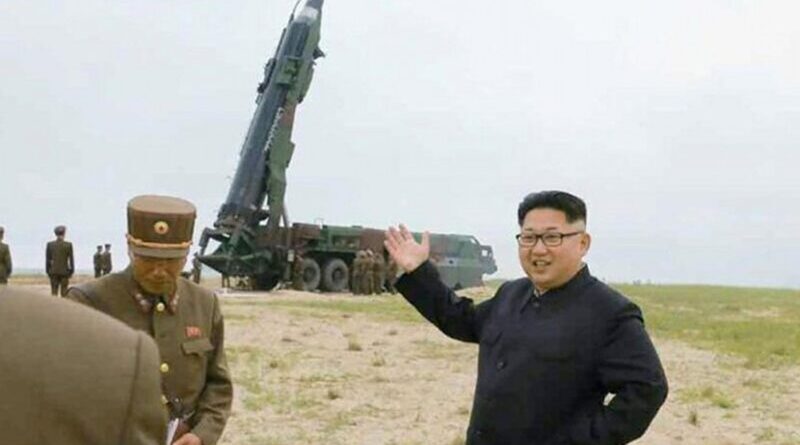Fixing The Deadlock On North Korean Denuclearization – Analysis
By Chung-in Moon*
On 19 September 2018, after signing the Pyongyang Declaration with then South Korean president Moon Jae-in, North Korean leader Kim Jong-un declared his desire for the Korean Peninsula to be free from nuclear weapons. In his speech at the Rungrado 1st of May Stadium in Pyongyang that evening, Moon reaffirmed this.
North Korea followed its leader’s pledges by closing some nuclear test sites and showing a willingness to dismantle others. Before these moves, Kim Jong-un had already initiated a unilateral moratorium on nuclear and missile activities in April 2018. It seemed that a pathway to denuclearisation of the Korean Peninsula had finally been found.
But from the beginning of 2022, we witnessed a different picture. In January, Pyongyang cancelled its nuclear and missile moratorium and has test fired more than 50 ballistic missiles. Pyongyang also revealed its possession of tactical nuclear weapons. Kim Jong-un declared the irreversibility of North Korea’s nuclear armament, precluding any diplomatic negotiations on denuclearisation.
A golden opportunity was missed in February 2019. Former US president Donald Trump and Chairman Kim Jong-un met in Hanoi between 27–28 February for the second time. At the summit on 28 February, Kim proposed that the North would dismantle all nuclear facilities in Yongbyon in return for a partial relaxation of UN Security Council sanctions on North Korea. It was unprecedented.
But Trump turned it down and proposed the North abandon its nuclear and biochemical weapons and ballistic missiles completely. Kim still wanted further discussions during lunch, but Trump cancelled and left.
In late June 2019, Trump met Kim in Panmunjom for the third time and promised to suspend US–South Korea joint military exercises in return for the resumption of working-level talks. But his pledge was not kept, and North Korea rejected the United States’ proposal.
Although North Korea showed up to a working-level talk with the United States in Stockholm in early October 2019, there was no progress. The Trump administration continued a ‘maximum pressure’ strategy through intensified sanctions.
US President Joe Biden has not been interested in reviving summit talks and has favoured working-level dialogue. But Pyongyang has not responded, viewing Biden’s policy as no different from his predecessor’s.
North Korea does not occupy a high priority in Biden’s foreign policy agenda alongside issues regarding China, the Taiwan Strait crisis and the Russian invasion of Ukraine. Seoul contributed to opening channels of communication between Pyongyang and Washington. But the Hanoi summit setback dealt a critical blow to the Moon government, and Pyongyang began to show an increasingly hostile attitude towards the South. The Moon government ultimately failed to revive momentum for dialogue.
South Korea’s Yoon Suk-yeol government, inaugurated in May 2022, regards its predecessor’s North Korean nuclear policy as a total failure and has pursued a hardline policy. It has strengthened extended deterrence in partnership with the United States.
China is now rather indifferent. In the past, Beijing hosted Six-Party Talks. It also advocated diplomatic negotiations based on the principles of a ‘freeze-for-freeze’ of North Korea’s nuclear tests and South Korea–US military exercises. But caught between North Korea and the United States, China has been sidelined.
Japan has taken a hardline posture on North Korea by adhering to the principle of ‘denuclearisation first, dialogue and incentives later’, and has adopted unilateral sanctions.
Although a member of the Six-Party Talks, Russia has been a marginal stakeholder. It has coordinated with China at the UN Security Council in blocking measures targeted at North Korea. Pyongyang’s diplomatic support of Russia’s invasion of Ukraine is likely to make Russia a staunch patron of North Korea. Nevertheless, Russia does not support North Korea’s status as a nuclear-weapons state.
Major stakeholders share a common goal of denuclearising North Korea, but their approaches diverge. A breakthrough will require pragmatism and a new multilateral arrangement.
Seeking practical solutions should be a starting point. North Korea is a nuclear-weapons state in all but name. Setting complete denuclearisation as the immediate goal of diplomatic negotiations is unrealistic.
The most critical step is to listen carefully to what North Korea wants. North Korea’s desires include the suspension of joint military exercises, diplomatic normalisation and the lifting of sanctions. These demands should be addressed at any negotiations.
The United States is the only country that can satisfy North Korea’s demands. But since the Hanoi setback, mutual trust is deeply damaged. Third-party facilitators will need to jumpstart Pyongyang–Washington bilateral talks, while a multilateral approach in the form of Six-Party Talks also needs to be revived.
Given the past failure of Six-Party Talks, such a multilateral arrangement may sound idealistic. But the North Korean nuclear problem is unlikely to be resolved without reference to a comprehensive regional security perspective.
The ideal would be convening an annual Northeast Asian security summit. The North Korean leader’s participation would be indispensable. Kim would attend if a US president attended and if China persuades him.
The issue here is whether the United States and China can cooperate. Within an institutional framework, all agenda items could be addressed. Among others, these include denuclearisation, extended deterrence and South Korea–US–Japan joint military exercises.
Denuclearising North Korea is a perilous odyssey. Pragmatic attitudes coupled with multilateral arrangements can help navigating that odyssey.
*About the author: Chung-in Moon is Chairman of the Sejong Institute and a Professor Emeritus at Yonsei University. He was the Special Advisor on National Security and Foreign Affairs to President Moon Jae-in.
Source: This article was published by East Asia Forum


North Korea would be stupid to reach any denuclearization agreement with the Unted States short of actually getting an actual treaty passed through the United States Senate. If they make a deal with this administration, the next administration will renege on that deal and start a new round of sanctions and “pressure.”